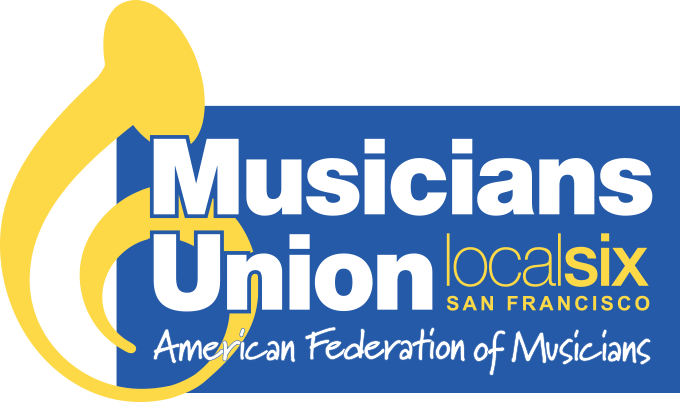
THE GOLDEN GATE PARK BAND IN 2015
Michael Wirgler is a Local 6 Life Member. He recently retired after 17 years as Director of the Golden Gate Park Band. He plays clarinet, saxophone, and flute, and is a composer, arranger, conductor, and music teacher. He currently plays in various groups including the Lamplighters and The Chabot College Wind Symphony.
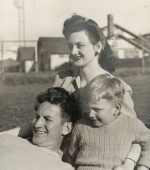
The Wirglers in 1944.
Michael Wirgler was born in San Francisco in 1941, a week after Pearl Harbor. His sister Suzanne was born a few years later. Michael’s father, Lou Wirgler, worked as a piano salesman. Active in the nightclub scene since the early 1930s, he was a bandleader for over 25 years. Before she got married, Michael’s mother, Marge, was a professional dancer whose troupe performed at the Golden Gate International Exposition, a World’s Fair which lasted for two years on Treasure Island. The Wirgler’s lived in San Francisco’s Marina District until 1949 when they bought their first house and moved to South San Francisco.
Michael started playing the saxophone in junior high. In high school he played in rock and roll bands with his friends. Michael recalls that his high school music teacher was very inspiring. “Our band teacher was a trombone player named Warren Heckman, who a lot of guys might know. He really got the thing going with high school bands becoming performing dance bands. We’d work up things and play for dances.”
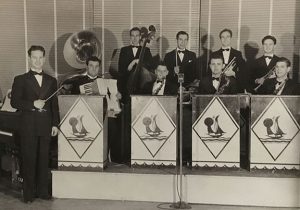
Michael’s father, Lou Wirgler, led his own band for over 25 years in San Francisco jazz clubs.
When Michael graduated in 1959, he had no idea what he was going to do next. “My mother suggested I go to the College of San Mateo, which was a really good experience. I think if I had gone straight to SF State or Cal I would have been out in the first semester.”
In college Michael immersed himself in the jazz program and played gigs outside of school. He joined Local 6 in 1961 along with the rest of his current band, the Rock-A-Fellers. “Pop Kennedy was the president. I remember he had us come in and audition. He was a tough guy.” On Friday nights Michael would often play with the Friday Night Band, a rehearsal band that played in the Local 6 rehearsal hall.
After two years of college Michael transferred to SF State where he began playing clarinet and discovered that he enjoyed teaching. In 1966 he graduated with a music degree and a teaching credential–
then he got drafted.
“I was in the army band, but I was also a combat guy. They gave me a choice of where I would be stationed. They said they could guarantee I would be at the Presidio in San Francisco for the first year, but they didn’t tell me the second year they could send me to Vietnam. Most weekends I went home to my mother’s cooking, but lots of guys didn’t have that luxury, or luck. That’s all it was–luck. They could have sent me anytime. There were two times where I was told I was going to Vietnam. I packed up and said my goodbyes–then it got cancelled. God was on my side.”
Michael served for three years. Though the band might have complained about the music, Michael says that after three years of playing every day he came out a pretty good clarinet player. During this time Michael continued to play with the Friday Night Band and ended up being the conductor. Through friends in the band he was introduced to his first wife. They were married in 1969 and soon had two children.
Michael’s first job out of the army was as a high school music teacher in Hayward. Unfortunately, the school cut its music program after the first year and he was laid off. He was able to scrape by on teaching private lessons, unemployment insurance, and the GI Bill. “I was married with two kids at the time. It was very stressful. I eventually got a teaching job in Oakland that stuck—I was there for 35 years.”
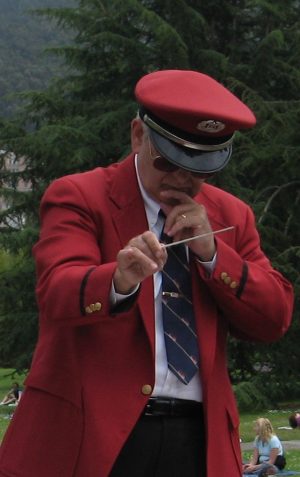 In the mid-70s Michael became a member of the Golden Gate Park Band, the Lamplighter Orchestra, and Conductor of the Alameda Community Band. “I was very serious about teaching, but I also loved playing and wanted to keep it up. I knew a lot of music teachers that got into teaching and then put their horns away and never played again.”
In the mid-70s Michael became a member of the Golden Gate Park Band, the Lamplighter Orchestra, and Conductor of the Alameda Community Band. “I was very serious about teaching, but I also loved playing and wanted to keep it up. I knew a lot of music teachers that got into teaching and then put their horns away and never played again.”
THE GOLDEN GATE PARK BAND
The Golden Gate Park Band began with 12 musicians and a makeshift bandstand in 1882. Popular from the start, they soon expanded to 25 musicians. The Temple of Music, their permanent home, was built on the Music Concourse in Golden Gate Park in 1900. 118 years later, through all kinds of weather, the band continues to thrive.
In 1999 when Bob Hanson, the Conductor of the band, decided to retire he handed the job over to Michael without any warning. “He came over to see me conduct in Alameda. I guess that was my audition. When he told me afterwords that I was the new conductor, I was in shock. I had to call him later and ask, ‘What did you mean by that?’”
Recently retired from teaching, Michael devoted himself to the Golden Gate Park Band, which was in a period of decline. “When I started playing with the band in 1974, we used to play every Sunday. Of course, some days we’d get rained out, but it was a year-round commitment. Little by little budgets got smaller and we did less and less concerts until we got down to 26. When I became conductor I was determined not to go below that.”
In the mid-2000s, around the time of the 1906 Earthquake Centennial celebrations, Friends of the Golden Gate Park Band was formed to help with community outreach and publicity. “Audience members would come up and say, ‘Gee, I didn’t know this was here, and I’ve lived in San Francisco my whole life.’ One of the most important things Friends of the Golden Gate Park Band have accomplished was to start a band festival–10 to 12 bands play over two days around one of our scheduled concerts. It’s been very successful.”
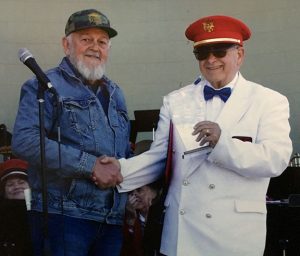
Dick Akright, President of Friends Of The Golden Gate Park Band, presents Michael with a momento on his retirement.
Today, Michael says the band is playing better than it ever has and the audience has grown in the past 3 years. “When I retired I wanted to turn it over in good shape, and I think I have. We created a committee and developed a process for how we were going to choose our next conductor—which turned out to be Bob Calonico. He’s the director of the Cal marching band.”
Now retired as bandleader, Michael keeps a full schedule playing with the Lamplighters orchestra, the Chabot College Wind Symphony, and the Alameda Community Band. He looks forward to finally taking a vacation this summer.
“The thing I always said to the audience was, ‘Some of us haven’t been here the whole time.’ It always got a laugh.” – Michael Wirgler
ALL ABOUT THE GOLDEN GATE PARK BAND
From the Golden Gate Park Band website: www.goldengateparkband.org
The Golden Gate Park Band concert season begins in April and continues most Sundays until October.
• Concerts begin at 1:00 p.m. and last about two hours.
• Concerts are performed in the Spreckels Temple of Music at the Music Concourse in Golden Gate Park.
• The Golden Gate Park Band has been playing free public concerts on Sundays in Golden Gate Park continuously since September of 1882.
• The Golden Gate Park Band is one of the last big-city outdoor bands to present a full season of free concerts.
The Golden Gate Park Band is a non-profit organization sponsored by the Recreation and Park Department of San Francisco. Donations to the Golden Gate Park Band fund are tax-deductible.
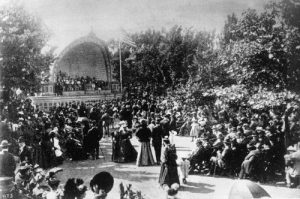 The Band offers a variety of music at its concerts including classic band favorites, operas, marches, Broadway show tunes, orchestral transcriptions, novelty tune, folk music, big band swing music and original works for concert band. Throughout the season, the Band features soloists from within its membership as well as guest artists.
The Band offers a variety of music at its concerts including classic band favorites, operas, marches, Broadway show tunes, orchestral transcriptions, novelty tune, folk music, big band swing music and original works for concert band. Throughout the season, the Band features soloists from within its membership as well as guest artists.
Each season, the Band collaborates with various ethnic and arts groups in San Francisco who bring to the concert their dance groups, costumes, singers, and music. For example, a season may include Mexican, Polish, Armenian, Italian, African-American, French, Hungarian, Ukrainian, and Spanish music and dance.
The band is a professional organization of highly skilled members of the American Federation of Musicians Union Local #6.
Help support the GGPB by attending performances, telling your friends, and by giving generously.
THANKS MIKE!
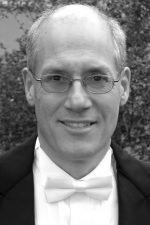 BOB CALONICO
BOB CALONICO
“The Golden Gate Park Band was my first job after I joined the Union in the early 70s. Mike and I were stand partners for about four years, and since then, we have played together from time to time with Lamplighters. And now, I have been selected to follow him as director of the Golden Gate Park Band. Mike has left big shoes to fill, and it will be a big challenge for me to meet the high standards he has set.
Thanks, Mike, for all your hard work and dedication to the Golden Gate Park Band!”
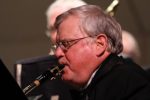 MICHAEL RYAN
MICHAEL RYAN
CLARINET/ ASSISTANT CONDUCTOR
“I would like to say a few words about our illustrious conductor, Michael Wirgler. 17 years ago, the existing conductor, Robert Hanson, handed over the baton to Mike. This is also the time I became a regular member of the band. I can truly say that I have enjoyed every minute of playing in this band under the leadership of Mike Wirgler. He is not just an exceptional leader. He is someone who has done a superb job of wearing all the required hats of this position plus being an outstanding composer and arranger. We are grateful for your musical and organizational skills and wish you the very best.”
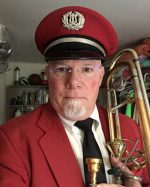 HALL GOFF
HALL GOFF
“During that stretch of time when the band shell in Golden Gate Park was being retrofitted for seismic safety, the Golden Gate Park Band played their Sunday concerts in front of the fountain in Strybing Arboretum and Botanical Garden. Consequently, we in the band teamed up to move and set up (and tear down) all of our equipment each Sunday, including the P.A. system, for several seasons. I remember being alternately chilled by fog, scorched by the sun, and always buffeted by the wind through those San Francisco summers. Wind clips were a must, and page-turns were especially challenging!”
 BILL ARON & GRACIE
BILL ARON & GRACIE
“I started playing with the Golden Gate Park Band on a regular basis in 2006. After several years I asked Mike if he would mind trying an arrangement of the Creston Sonata for Alto Sax that I had been working on. He agreed and from that point on, I would bring in an arrangement every year or so, which allowed me to get in some solo work and a little arranging practice.
The culmination for me came last year, when Mike wrote a Concertino for Eb Alto Saxophone and Piano, which he then arranged for the band. It was quite an honor to have a piece written for me. It was a wonderful piece to perform. Keep ‘em coming Mike.”
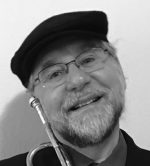 MARK NEMOYTEN
MARK NEMOYTEN
My first encounter with Mike was also one of my first gigs in the Bay Area as a Local 6 member. Fresh out of San Francisco State I started subbing with the Golden Gate Park Band. One of the players that immediately caught my attention was Michael, who performed with the band as principal/solo clarinet. His musicality, accuracy and consistency as a player impressed me and made a lasting impression. Years later, after I became a tenured member of the band, Mike took the job of conductor/director of the band and brought those high standards with him. It took him a short time to find his own approach to programming and rehearsing the band. He greatly expanded the repertoire of the band, keeping many past traditions alive while also putting his own stamp on them.
As the Union Steward and founder of the Player’s committee of the band I often found myself sitting across the table from Michael in negotiations which at times became contentious but were for the most part cordial and professional. Protecting and furthering the legacy of the Golden Gate Park Band has been our common goal. During his tenure as conductor our performance standards have grown as has our audience and the support we get from that audience. I know he’s going to enjoy getting to sleep in on Sundays, but I hope he can find the time to sit in with the band now and then.
###
